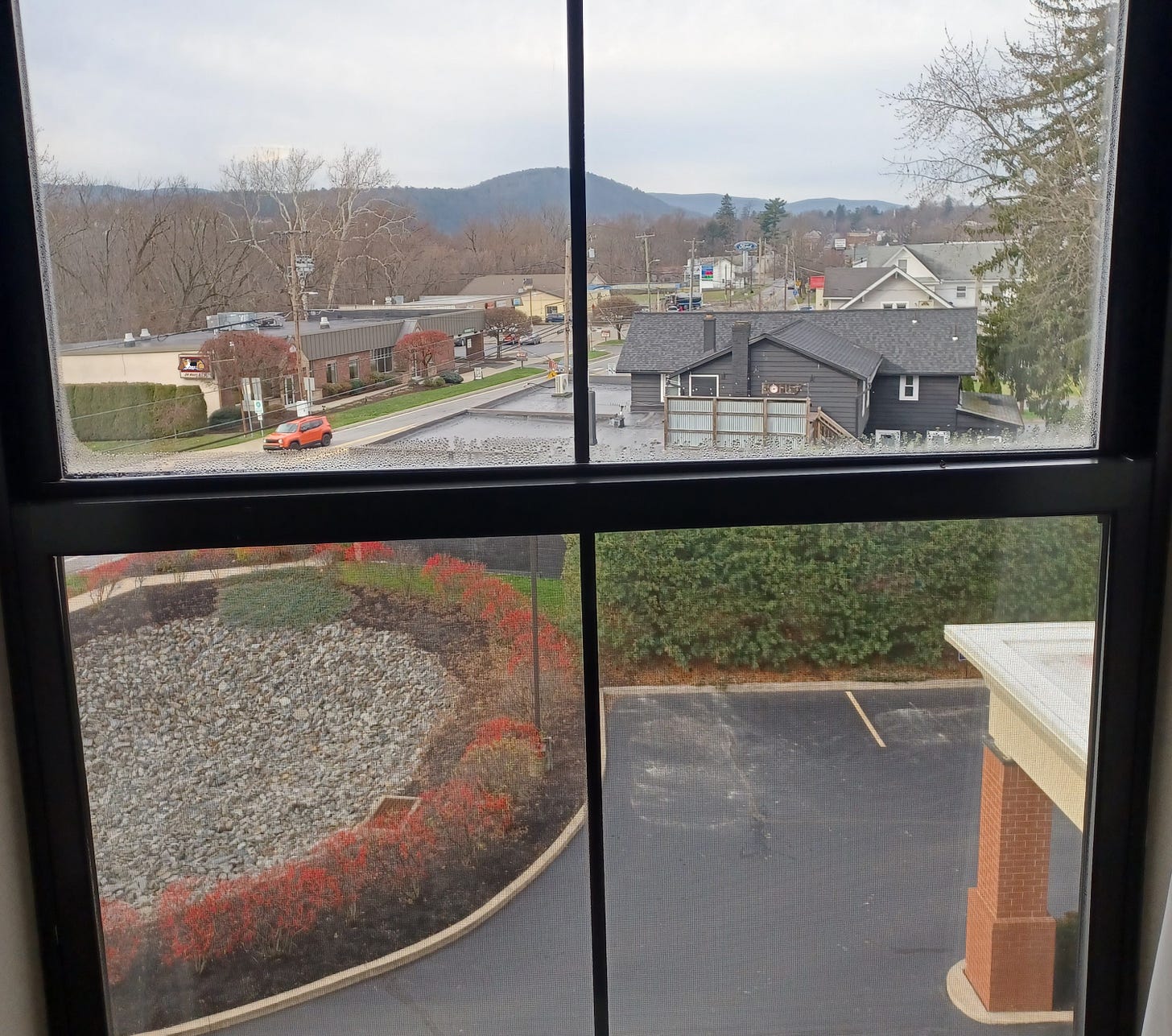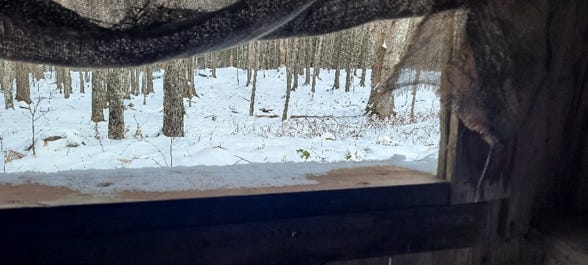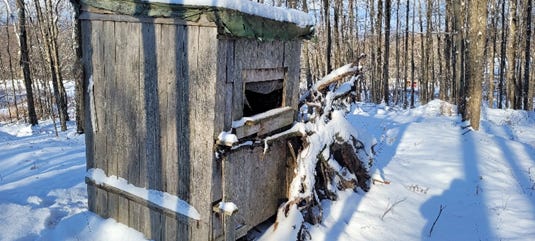
I took the Thanksgiving break as a chance to get back to Blighty for ten days to see my family, and old and new friends. I do this roughly once a year — but this year was a little different. My dad died more than two years ago, and because no real funeral was possible under Covid, we finally managed to organize a memorial of sorts: we set up an exhibition of his paintings and invited everyone he knew to reminiscence about him for a few hours.
Grief is a strange and unpredictable thing — especially when you no longer live in the same country your parents do — and I realized I’d never really absorbed it all until now: the violence of his sudden death falling backwards down the stairs, breaking his neck; that mixture of conflicting feelings every kid who grew up in the shadow of an intermittently volatile home will feel upon losing their mom or dad; the intense love, sadness, and anger that flood back. It didn’t really surprise me when I came down with pneumonia a few days later. The body grieves as well.
Maybe this is all TMI for a newsletter — scratch that, it absolutely is TMI for a newsletter — but Dishheads know I try to write from the heart as well as the head, and after two decades with y’all, I don’t feel like putting up a front. When the old Dish was daily, hourly, it was impossible to hide my moods, my life’s ups and downs, or my bouts with illness. And the idea that a nonfiction writer can always separate the private and the public is as admirable and virtuous a goal as it is, for me at least, impossible. So herewith, some reflections on my native land.
Brexit and its Tory architects are in severe danger. It’s extremely hard to disentangle Brexit’s effects from the two catastrophes that coincided with its long-delayed implementation: Covid and the Ukraine War. Either economic crisis would have blown Brexit’s impact out of the water — but both of them in swift succession make the economic and political picture something only future generations will be able to parse with any accuracy.
The one clear thing, it seems to me, is that Brexit has made trade with Europe harder and burdened with new regulations and paperwork. But the predictions of instant economic collapse haven’t been borne out; London’s financial role hasn’t been tarnished much; and the EU hasn’t exactly been covering itself with glory either. Still, we’re reaching a clear moment when the public has turned decisively against Brexit:
It’s a decisive, probably permanent, shift. The Liz Truss debacle showed that even outside the EU, the British government could not chart a supply-side alternative toward the global Singapore-on-Thames model — because public debt was far too high to pull it off. Rishi Sunak was always a Brexiteer — but it was Boris who won it, and Boris alone who could sell it to more than half the country. The UK government does have a lot more control over its own laws and borders than it did, but most Brits don’t experience that. Meanwhile, after Boris’s splurges, and the cost-of-living crisis, a return to austerity and stagflation now looms.
But Brexit has also disappointed those who supported it in order to slow mass immigration. The Johnson government’s end to freedom of movement from the Continent — and the new points-based immigration system — didn’t lead to a reduction in the pace and volume of mass immigration. It just changed where it came from (more from outside Europe) and changed the skillset of the new immigrants (higher than before).
The new UK Census shows that from 2011 to 2021 — a decade entirely under Tory government — the proportion of the population born outside the UK grew by 33 percent. So today, one in six Brits in England and Wales are foreign born: 16.8 percent. That’s now higher than it is in the US (14.6 percent) — which is itself near a historic peak in a vast continent with a long history of mass immigration. Forty percent of the foreign born came in the last ten years. The change is less pronounced in many parts of England and Wales, where the “White British” share of the population is highest; but ever-more pronounced in already diverse towns and cities.
You see the change most powerfully in London, as Eric Kaufmann notes:
In 1971, the proportion of Londoners who were “White British” was 86.2 percent. Fifty years later, it’s 36.8 percent. That’s not a population change; it’s an entire paradigm shift.
Some of the friends I saw last week love this. “I cannot tell you how happy it makes me,” one told me, “that I can go around London and never hear English spoken!” And there are times I see her point: London is far more dynamic, diverse, and prosperous than it was in my childhood. I love much of it too — I’d much rather live in the London of 2021 than 1971 — and feel pride in my native land’s capacity to be so inclusive. But this is little short of a cultural revolution in a tiny, already densely packed island, which knew minimal immigration for centuries until the 1950s and 1960s.
Philip Larkin wrote a poem in 1972, “Going, Going,” about the pace of change in his native land:
It seems, just now,
To be happening so very fast;
Despite all the land left free
For the first time I feel somehow
That it isn’t going to last
He was talking about putting economic and population growth before cultural and environmental stability, and not specifically about demographic change (though his views on the latter were similar, if not downright reactionary).
And that will be England gone,
The shadows, the meadows, the lanes,
The guildhalls, the carved choirs.
But the change he lamented was utterly trivial compared with what is happening now, let alone what is now baked in for the next few decades. The phrase “great replacement” is rightly abhorred for its racist, anti-Semitic inspirations. Larkin eschewed any idea of a conspiracy of some kind:
Most things are never meant.
This won’t be, most likely;
But an accidental revolution is still a revolution. And I would just ask those who rightly denigrate the term “great replacement” to provide an alternative phrase to describe a city which was 87 percent “White British” a half-century ago and 36 percent today? It’s the kind of demographic change only previously seen in other parts of the world in times of plague, invasion, or campaigns of ethnic cleansing.
And then I think of George Orwell’s passionate defense of Englishness, his fusion of that patriotism with socialism, his detestation of the kind of left elites who now foment not just demographic but cultural revolution out of hatred of the past, performative virtue-signaling and thinly veiled contempt for so many of their stodgier countrymen. I think of his conviction that “it needs some very great disaster, such as prolonged subjugation by a foreign enemy, to destroy a national culture.”
Orwell backed huge structural changes in British society in 1941 and yet insisted that a nation could retain its cultural integrity:
The Stock Exchange will be pulled down, the horse plough will give way to the tractor, the country houses will be turned into children's holiday camps, the Eton and Harrow match will be forgotten, but England will still be England, an everlasting animal stretching into the future and the past, and, like all living things, having the power to change out of recognition and yet remain the same.
I hover between these two visions of pessimism and optimism as I watch the English-speaking world transform. Conservatism is a complex and internally conflicted fear of radical change alongside confidence in the permanent reality of human things across time and space — and I oscillate between the two all the time.
My dad was not political. He wasn’t religious. But he loved England, his small town, his gardening, rugby and cricket, and he painted landscapes of his native land. And he was an optimist, constantly telling me that whatever else was going on in the world out there, his little part of it was still minding its business, that nothing was as bad as I imagined, that it would all “come out in the wash.” “Oh dear, oh dear,” he’d say, in his most extreme form of disapproval. He’d find Tucker Carlson preposterous, Donald Trump ridiculous, and wokeness silly. But he refused to get that upset about any of it. He was more interested in present laughter than cultural panic, and when it came to accepting his gay son, he never skipped a beat.
Tolkien understood these inhabitants of the Shire, how their modesty and traditionalism might seem unprepossessing, but in a pinch, it was those ordinary country folk who could save the world in ways others couldn’t or wouldn’t. And in the darkest year of the last century, on the journey in their little boats across the Channel to Dunkirk, they did in a way.
May they all rest in peace. And may the England they loved somehow survive the cultural revolution that is so swiftly and carelessly succeeding them.
(Note to readers: This is an excerpt of The Weekly Dish. If you’re already a subscriber, click here to read the full version. This week’s issue also includes: a rich conversation with Kyle Harper about plagues throughout history; my long response to a reader dissenting over marriage equality; nine noteworthy quotes from the news cycle; 13 Substack pieces we enjoyed this week; a Creepy Ad Watch on suicide; a Mental Health Break of a planetary painting; a window view of wintry perfection; and, of course, the results of the View From Your Window contest — with a new challenge. Subscribe for the full Dish experience!)
From a long-time reader and subscriber:
I just saw Jon Stewart on Colbert defending his friend Dave Chappelle’s SNL monologue, which made use of some anti-semitic tropes to make a larger point. As a Jew, I wasn’t offended by Chappelle and I found myself agreeing with Stewart’s defense of him:
Given your experience on Stewart’s show and how he’s been quite trigger-happy to call someone “racist” or any other label, I imagine you’d find his defense of his friend nauseating or at least highly convenient. But maybe one can hope he’s changed his ways, now that the mob is coming close to his gates, and that he really will engage people in a dialogue and stop the name-calling. He’s right, of course; it’s utterly unproductive. Whenever someone yells out “TERF” or “racist” or “anti-semite” from the sidelines while snickering and high-fiving their friends, they’ve only labeled themselves as someone who isn’t serious about solving the problem.
Truth be told, I’m only acting all sanctimonious now because I’ve taken the time to stop and reflect on the reflexive name-calling and the braindead herd-think I used to engage in. And I have the Dish to thank completely for helping me reach this point. Though I disagree with you on many issues, your podcast and the newsletter have, without exaggeration, given me an intellectual renaissance. (I had outsourced so much of the intellectual heavy lifting of my political life to The Atlantic and Vox.) I’m finally taking responsibility for my own critical thinking.
So thank you and Chris for the brain gym you have provided with the Dish. Your pod conversations with guests from so many disciplines have helped me challenge my own ideas, hear from people I never would have sought out otherwise, and think critically about the frameworks and lenses I use. (Your conversation with Cornel West was the one that really lit the fire in my brain.)
That email cheered me up. By the way, I’m glad Stewart defended Chappelle and comedy’s integrity. I’m glad he violated the taboo on the Covid lab-leak theory on a previous show. I long admired him. His recent emergence as a bigot for the left doesn’t capture his complexity or talent. I’d happily have him on the Dishcast to hash this out.
New On The Dishcast: Kyle Harper
Kyle Harper is an historian who focuses on how humanity has shaped nature, and vice versa. He’s a Professor of Classics and Letters at the University of Oklahoma and the author of several books, including The Fate of Rome: Climate, Disease, and the End of an Empire, and his latest, Plagues Upon the Earth: Disease and the Course of Human History. His mastery of the science is only matched by the ease of his prose. If I were to nominate a book of the year, it would be this one (alongside Jamie Kirchick’s Secret City).
Listen to the episode here. There you can find two clips of our convo — on the zombie bloodsucking fleas of the Black Death, and on how Covid doomed the careers of Trump and Boris. That link also takes you to discussion of our episodes with Robert Draper and Damon Linker. A listener writes:
I just wanted to say I thoroughly enjoyed listening to both Linker and Draper. I usually listen to the Dishcast on my way to work, and depending on the scenic route I take, I can listen to a whole episode. Thanks again from a devoted listener and reader. And Happy Thanksgiving!
Browse the entire Dishcast archive for an episode you might enjoy.
Dissent Of The Week: A More Perfect Union?
A reader writes:
Your latest column on marriage equality was thought-provoking and well-crafted. But I was disappointed by the clear implication that those of us who continue to disagree on gay marriage (including Ben Shapiro) must only be motivated by homophobia. I recognize that this is a deeply personal issue for you and that you have devoted much of your life to it, but I thought that was quite unfair.
Go here to read the rest of that dissent, along with my long response. There’s more discussion on our pod page. As always, keep the comments coming: dish@andrewsullivan.com. A quick clarification from a reader:
You wrote, “a civil marriage license legal in one state must be legally respected by other states.” It’s a marriage certificate, not a marriage license. The license only allows a couple to get married. Many county clerks offices have a big sign: “Your marriage license does not mean you are married; it authorizes you to get married.”
Creepy Ad Watch
Katherine Brodsky cringes over a corporation glamorizing a woman’s suicide through the Canadian MAID program:
The choice to end your life is the most private, most intimate, most difficult decision of all. It does not belong on the public stage. And it certainly should not be a marketing campaign to sell clothes.
In The ‘Stacks
This is a feature in the paid version of the Dish spotlighting more than a dozen of our favorite pieces from other Substackers every week. This week’s selection covers topics such as the Covid uprising in China, Qatar’s deep illiberalism, and Peter Thiel. Below is one example, followed by a brand new substack:
Razib recommends the best products for your own DNA testing.
Welcome, Mike Pesca!
You can also browse all the substacks we follow and read on a regular basis here — a combination of our favorite writers and new ones we’re checking out. It’s a blogroll of sorts. If you have any recommendations for “In the ‘Stacks,” especially ones from emerging writers, please let us know: dish@andrewsullivan.com.
The View From Your Window Contest
Where do you think it’s located? Email your guess to contest@andrewsullivan.com. Please put the location — city and/or state first, then country — in the subject line. Proximity counts if no one gets the exact spot. Bonus points for fun facts and stories. The winner gets the choice of a VFYW book or two annual Dish subscriptions. If you are not a subscriber, please indicate that status in your entry and we will give you a free month subscription if we select your entry for the contest results (example here if you’re new to the contest). Happy sleuthing!
The results for last week’s window are coming in a separate email to paid subscribers later today. A frequent sleuth sends a “View From My Hunting Blind”:
Below is a view from the blind on our country property from which my brother-in-law hunts deer. I thought you might want to add it to the gallery of views from unusual places:
On hunting days, my brother-in-law rises very early to be in the blind well before sunrise. Deer are most active at dawn and at dusk. He sits there in the cold and dark, eating bologna sandwiches and waiting for first light, hoping a deer will wander into his site.
It does not appeal to me, but he enjoys it. The animal rights folks may be happy to hear that, for the first time in five years, he walked away empty-handed. And many hunters failed to bag their quota. It was not a good hunting season … well, I guess it was for the deer.
See you next Friday.









